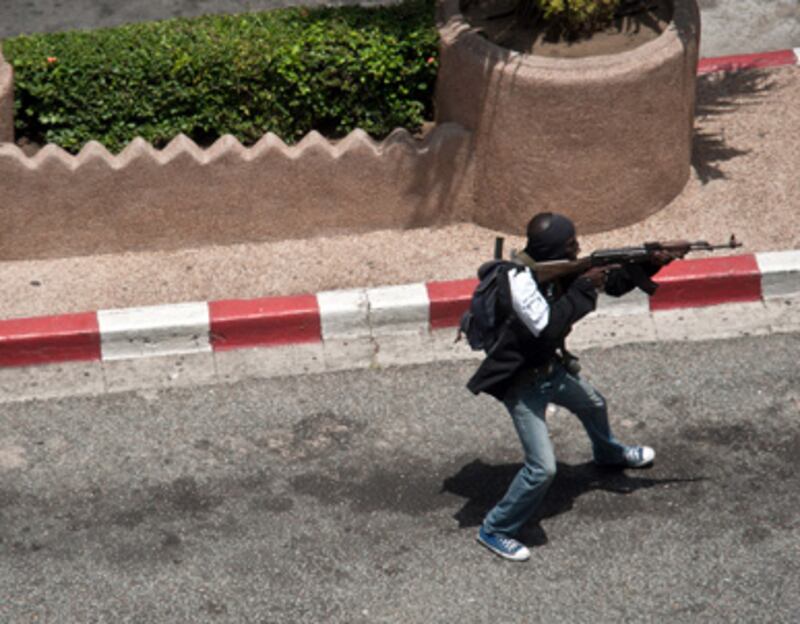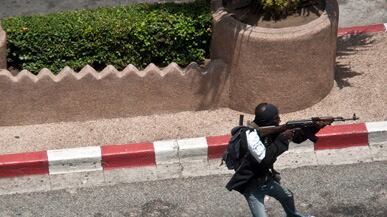UPDATE: Despite earlier reports that he was negotiating an end to a brutal succession conflict, Ivory Coast strongman Laurent Gbagbo defiantly insisted Tuesday that he is legitimately the president and he will not step down. Speaking via phone from a bunker inside the presidential residence in Abidjan, Gbagbo said the Reuters report that said he had surrendered and was seeking U.N. protection is wrong. French and U.N. forces launched air strikes against Gbagbo Monday in support of his challenger, Alassane Ouattara, who is recognized by the international community as the rightful winner of the last presidential election. Despite the U.N. and French pressure, Gbagbo insisted “I won the election and I am not negotiating my departure.” The Daily Beast's Julia L. Ritchey reports from West Africa.
In Abidjan, Ivory Coast, residents have barricaded themselves in their homes, away from the heavy gunfire, as gangs of rival armed militiamen are patrolling the streets in pickup trucks, and gun-toting youths are looting shops and houses whose terrified occupants have long since fled. A few brave souls are risking their lives in search of sustenance, scurrying outside looking for water and trolling the markets in search of food—only to be confronted with long lines and mostly empty shelves. Last night, all were cowering indoors, watching French and United Nations helicopters drop bombs and flares on the presidential palace, state television building and military camps.

Beyond the locked doors, forces loyal to Alassane Ouattara, the man the international community agrees won a Nov. 28 presidential, election, have launched a major assault on the city, determined to once and for all evict Laurent Gbagbo, the long-time president who lost the election but has refused to step down. In addition to the rebels, Gbagbo now faces French and U.N. peacekeepers, who fired on his militias after days of harassment. France, the former colonial power, has authorized its forces to take out Gbagbo's heavy weaponry. And Abidjan is emerging as the Ivorian strongman’s last stand.
“Militarily speaking, Gbagbo is naked,” said Rinaldo Depagne, an analyst with the International Crisis Group. He predicted the embattled and obstinate leader will fall in a matter of days.
Gbagbo’s ouster cannot come soon enough for this West African country, whose citizens recently have been brutalized by vicious cadres from both sides, with hundreds reportedly massacred around the country and many having to flee to camps and even churches to escape gun- and machete-wielding thugs masquerading as soldiers. Most lay the blame at the feet of Gbagbo, 65, the latest in a seemingly endless line of African and Middle Eastern leaders, like Robert Mugabe in Zimbabwe and Ali Abdullah Saleh in Yemen, who can’t let go of power. Gbagbo has been particularly brazen, rejecting results of an election that observers say he clearly lost. The president, who rose to power a decade ago, did not want to hold a vote in the first place, and managed to postpone it for five years. The election was part of a political peace agreement to unify the country following its civil war that began in 2002. That conflict split the country in two, with rebels holding the predominantly Muslim north and Gbagbo's government controlling the majority-Christian south.
Gbagbo has hunkered down in the face of a slew of diplomatic and economic sanctions, and repeated calls—from the African Union, European Union, United States, and the West African regional bloc known as ECOWAS—to step aside, insisting he won the election. For months he has stayed put in the presidential place, forcing Ouattara, 69, to remain holed up inside an Abidjan hotel surrounded by U.N. peacekeepers. In a situation that’s sometimes resembled farce, Ouattara has tried to operate a parallel government from his humble hotel quarters.
“Militarily speaking, Gbagbo is naked,”
His rival, meanwhile, retained significant support—the country’s constitutional officials went so far as to overturn the election results, an action that sparked the crisis—and militias loyal to Gbagbo have circulated about the nation, raping, looting and killing people, including women and children. Gbagbo himself has managed to drum up support from some Ivorians by accusing foreign governments of instigating the moves against him.
International sanctions have managed to cripple Ivory Coast's economy, and the country does not much resemble the nation whose thriving coffee and cocoa industries in the 1960s and ‘70s brought it significant economic prosperity. Despite the hardships, Gbagbo has hung on. It wasn't until pro-Ouattara troops began advancing toward Abidjan last week that the tide began to turn. Ouattara's Republican Forces captured 80 percent of the country in a lightning-fast offensive that lasted less than a week. Those forces reached Abidjan last Thursday and have been poised to strike ever since. Republican Forces have been hesitant—until now—to engage in urban warfare, said J. Peter Pham, director of the Ansari Africa Center think tank. “It's going to be bloody on both sides, with the potential for a humanitarian catastrophe and upwards of 4 million people caught between the two sides,” Pham said.
With the conflict set to descend into such massive violence, France has taken over the airport and sent in more than 450 additional troops in the last two days in anticipation of evacuating thousands of foreign nationals.
Chaos and confusion are increasingly hallmarks of Ivory Coast, and almost no one knows who actually controls Abidjan, because of a shortage of reliable information coming out of the city. As of Monday afternoon, Gbagbo still controlled Ivorian state television, the RTI, which his side has used to its advantage to issue propaganda and send out pleas for additional forces to take up arms against Ouattara. RTI has broadcast footage of a smiling Gbagbo in a bright shirt casually chatting with supporters next to his wife, Simone. Footage of the recalcitrant leader, supposedly from a few days later, showed him in the same shirt. On Tuesday, there were news reports that he is currently negotiating surrender from an underground bunker at his residence, which is surrounded by Ouattara's forces.
Even foreign journalists inside the city have struggled to ferret out information. Since Ouattara's forces entered Abidjan, most reporters have been trapped inside hotels and offices. Some updated their Facebook pages to report that they were safe. One journalist said she'd been sleeping on couch cushions in her office and living off canned tuna. Those at the Novotel hotel on Monday were surrounded by Gbagbo's forces and fired upon when they tried to go outside. A few journalists still trying to enter the country from Ghana were turned away at the border by gun-waving militias loyal to the obdurate president.
Speculation has swirled that Gbagbo may flee the country. But even if he did, that would not necessarily end the slaughter—or human rights abuses. Heinous crimes, witnesses say, have been committed by militias loyal to both Gbagbo and Ouattara. The Red Cross and the Catholic charity, Caritas, reported that they had discovered between 800 and 1,000 slaughtered civilians in one town in western Ivory Coast last week. It is not yet clear who was responsible, but rights groups say some of the killings may have been carried out by Ouattara supporters. Those forces have denied responsibility. They also argue that the death toll was much lower.
Human Rights Watch officials say they've also documented numerous cases of pro-Gbagbo militiamen targeting vulnerable groups, including Muslims, West Africans and Ivorians from the north. The rights group has repeatedly urged both sides to avoid civilian casualties, especially now that the fight has moved to a major metropolitan center. “If there is to be a battle, then let it be between armed individuals from on side against armed individuals on the other side. And those individuals are obliged to respect international humanitarian law, which means not killing prisoners, and certainly not killing and targeting civilians,” said Corinne Dufka, a Human Rights Watch researcher in West Africa. And Rupert Colville, a spokesman for the U.N. High Commissioner for Human Rights, warned that both sides will be “held accountable” for rights violations. The Geneva-based Human Rights Council has already dispatched a commission of inquiry to investigate alleged abuses.
For now, the conflict appears to be one that Ouattara will win—Gbagbo’s ouster appears imminent. But given Ivory Coast’s economic shambles, and a level of violence likely to scar the country for years to come, how governable the republic will be once Gbagbo is gone remains in question. “Ouattara is in a difficult position. It's going to be very difficult for reconciliation to take place, having essentially conquered his way to the presidency with the use of one side of the civil war, the northern former rebels, to militarily occupy the south,” Pham said. He added that the international community must pay close attention in the days, weeks and months ahead if another full-blown civil war is to be prevented. Regardless of who ends up occupying the much-coveted presidential palace, the deep divisions exposed by the post-election fallout will remain in Ivory Coast.
Julia L. Ritchey is a freelance journalist based in Dakar, Senegal. She covers politics, culture, the environment and human rights in Francophone and Anglophone West Africa for the Voice of America.






